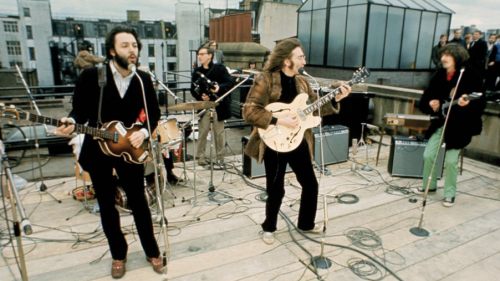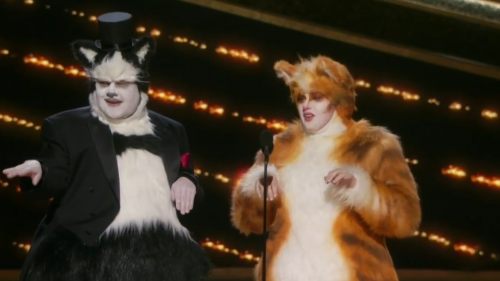RETURN OF THE KING: The Last Blockbuster To Win Best Picture
Last week I wrote about Ordinary People, and how it was a Best Picture winner that doesn't feel like one, because it's so small and unassuming (but great!). Well, now I'd like to visit the other end of the spectrum; Return of the King is a Best Picture winner that doesn't feel like one simply because it's so damn BIG.
(With that, I'll pause now for you to make your tired jokes about all of its endings.)
The runtime for the version that netted Oscar gold is 201 minutes, which puts it almost exactly between Titanic and Ben-Hur (the two films that it shares a fairly prestigious record with that I'll discuss later), and the director's cut version is a whopping 265 minutes including credit sequences - around a half hour longer than Gone With The Wind (current, and probable forever record holder for longest Best Picture winner). It has something like 100 speaking parts, large scale battle scenes that were (at the time) more advanced than anything we had ever seen before, and was, at the time, the sixth highest grossing movie of all time domestically (and #2 worldwide, though of course both figures are pre-inflation). It wasn't just big, it was gigantic in every way possible. After the first two films were nominated and lost, Return of the King finally netted the big prize - seemingly for the series as a whole instead of any specific merit the film offered over Fellowship of the Ring and The Two Towers.
I revisited the film over the weekend, watching on its own for the first time ever (my previous viewings were always preceded by the other films, i.e. "watching the trilogy"), and when I wasn't just sighing at how much better a filmmaker Jackson used to be, I was marveling at how easily the film sucked me in even though it's been nearly nine years (!) since I last visited this world (not counting the Lego version). I couldn't quite recall why Wormtongue was angry at Saruman, or why the ship captain from Titanic was important to the story, but even though it was over four hours long (I should have watched the theatrical version since that's the one that won, but I only have the extended ones) I found it engrossing and charming throughout. I didn't need a refresher to feel for Samwise when Frodo chose Gollum over him, I still got a bit choked up at "You bow to no one," and it's simply lovely when the Fellowship is reunited after nearly two whole films apart. But I got the same sort of crowd-pleasing emotions when I watched The Rock last week, and no one even joked about nominating that for Best Picture, let alone giving it the award - so how did ROTK manage to do it?
Much like awarding Scorsese his first Best Director award for The Departed, it's easy to assume that the Academy wanted to make sure something notable had gotten its due while they still had the chance. With a person like Scorsese, the fear is just that they may retire, or simply have their best days behind them - better to reward a solid film like The Departed than have to settle for lesser work later. But with Return of the King, it was the finale of a giant gamble, the likes of which haven't been attempted since (even The Hobbit doesn't count), and a worldwide phenomenon to boot. Oscar-y, in itself? Of course not - this is a movie that has a talking tree, a dwarf burping his way through a drinking contest, and a climax involving a monster fighting an invisible man. When it has an intermission, it's not with Scarlet O'Hara declaring she'll never go hungry again, but with a wizard's fearful realization that a bunch of monsters have secured a really BIG battering ram to use on a castle. Stripped of its history, and you'd be left with a movie that got rewarded in the technical categories and ignored elsewhere.
But no, The Academy opted to do the right thing and give such an ambitious (and successful!) project the ultimate reward for their efforts. It didn't just award it Best Picture, but Peter Jackson got the gold for his directing, as did the screenplay (by Jackson, Fran Walsh, and Philippa Boyens). It won eight other awards that night, tying Ben-Hur and Titanic for the most Oscars for a movie ever (it didn't actually lose a single award that night, something the other two films can't claim as they were up for more than their eleven winning nominations). Did Jackson really do a better job directing this installment over the others? Not that I can tell, and the script is damn near incomprehensible without knowing the other two movies' plots, as even the extended version doesn't bother with much of a recap of why anyone is doing anything. But it was the achievement as a whole that they were focusing on - a production that spanned years, all hinged on the public making the first movie a hit since they had already shot its sequels. Nowadays we hear about movies being the start of a trilogy all of the time, but more often than not we don't actually get those second and third parts due to an underwhelming performance from the first (see: Terminator Salvation, which seems to be ignored by the upcoming Genisys, which of course is also starting a trilogy).
Interestingly, since its record haul the Academy hasn't opted to give any films of this nature the big prize, just some nominations and "smaller" awards. In 2009 Avatar was "upset" by Hurt Locker, having to settle for just a few technical awards, and last year Gravity took home Best Director and six other awards, but lost Best Picture to 12 Years A Slave (and wasn't even nominated for its screenplay). There have been hit films winning the big prize, of course - Argo and The Departed had both cleared 100m before their big wins - but nothing that would be covered in Starlog, that's for sure. Return of the King's competition was mostly other bigger budgeted studio films, the sort of stuff you see nominated all the time like Mystic River (that year's Clint Eastwood offering) and Master & Commander (that year's Russell Crowe film*). The lone exception was Lost in Translation, which won the original screenplay award that night but saw Peter Jackson and his Orcs take its other chances away. However, the Lost in Translation types would start taking over; the following year had more lower budgeted productions in the race (well, two), and then the year after that, only one of them was a traditional big-budget film (Munich, which at $77 million cost around double all of the other films combined).
And this new tradition continues. From this year's crop of eight films, only one has a budget north of $20m (American Sniper), and that's also the only one that's joined the $100m club (until Sniper opened wide this past weekend, it was the lowest-grossing batch of Best Picture nominees since the category's expansion in 2009). Folks may whine about the Academy "playing it safe", but it seems to me they are shying away from giving too much credit to the Peter Jacksons of the world (including Jackson himself; his first two terrible Hobbit movies were up for 3 technical awards each, winning none; this newest one is up for a single award that it will likely not get) and rewarding smaller films, even if it means lower ratings for their broadcast, for which they should be lauded. They had two Best Picture slots left - they could have easily given one or both to bigger films just to get those films' fans tuning in (Interstellar, Unbroken, and Gone Girl are the obvious "snubbed" selections), but it seems, for now, the days of seeing a lot of crossover in the Best Picture and Best Visual Effects categories are behind us. Hell, maybe a movie like Ordinary People CAN win again someday!
*I never realized this, but from 1997-2003 Crowe starred in FIVE Best Picture nominees, with two of them (Gladiator and Beautiful Mind) winning. Incidentally, he was one of Jackson's choices for Aragorn.



